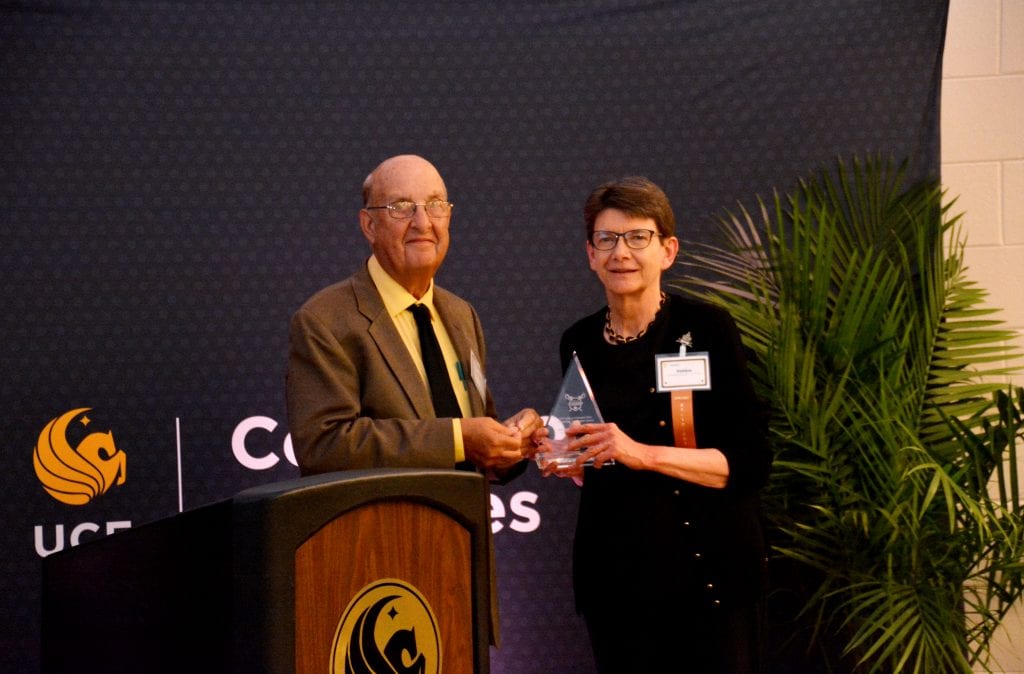A Lifetime of Chemistry

Debbie Dunn, Ph.D., graduated with a chemistry degree from UCF in 1972, back when UCF was still known as Florida Technological University (FTU). Graduation is always a momentous occasion, but Dunn’s held even more importance than a simple first step in her career. When she walked up to receive her diploma, she started on the path to becoming the very first chemistry student from UCF to ultimately earn a doctorate degree in the field.
Dunn has had a long and fulfilling chemistry career working in and alongside the pharmaceutical industry. But there was a moment when she was just a student with an associate’s degree, looking to transfer to FTU.
“At the time, FTU was brand new and touted to be focusing on science degrees,” Dunn said. “I had decided to major in a science and, feeling physics was going to be too hard and biology had too much memorization, chemistry was my choice.”
Her decision led to spending the next two years in labs, alternating between her courses and studying.
“The school was so new that there were no sports teams or many extracurricular activities,” she said. “With so few distractions on campus, I was able to study and get through all of the required chemistry classes.”
It was her advisor, Chris Clausen, Ph.D., who convinced her to consider graduate school. Dunn chose to attend Florida State for her higher education, and Clausen’s guidance helped earn her the title of UCF’s first alumna with a Ph.D. in chemistry.
“His recommendation to go to graduate school was the best career advice I have ever been given,” Dunn said. “My Ph.D. was like a ticket that opened doors I never anticipated.”
Even though most of her education had been spent in a traditional chemistry laboratory, she wanted a change. After receiving her Ph.D., Dunn switched to working in a computer lab instead of a traditional lab setting.
“Luckily I had audited a biochemistry class in graduate school,” she said. “I landed a postdoctoral fellowship in the new field of computer-aided drug design using molecular graphics.”
After the postdoctoral position, she became a Systems Analyst at Lederle Laboratories, the division of American Cyanamid focused on pharmaceuticals. There she worked to design drugs by applying a variety of computer software tools.
“One of the software tools I used at Lederle was Chem-X, a program produced by Chemical Design Ltd. headquartered in the United Kingdom,” she said. “The founder of the company told me he was planning to open a U.S. office. He needed someone to lead this effort.”
Dunn jumped on the opportunity this presented. In 1985, she helped establish the company’s U.S. subsidiary, Chemical Design Inc.. She started as a consultant and later managed the company as its executive vice president. She was responsible for the sales and support of the Chem-X software to all U.S. universities and pharmaceutical companies.
UCF’s College of Arts and Sciences (before it split into the College of Arts and Humanities and the College of Sciences) selected her for the Professional Achievement Award in 1990, after recognizing her hard work in the industry.
“The things I liked most about working at Chemical Design were meeting potential customers and introducing them to the Chem-X software,” she said. “I also enjoyed working for a small company where we were truly focused on the organization being successful and didn’t have time for company politics.”
She remained as a vice president even after Chemical Design was acquired by a competitor, until it downsized and her location was closed.
Following the site closure, she was still actively involved with the pharmaceutical industry. She became a recruiter at Fortune Personnel Consultants, specializing in placing chemists in industry positions until she retired in 2004.
“Follow your instincts and passions,” Dunn said. “If you are working in a field you love and you have the excellent foundation of training from UCF, odds are that you will be successful.”
